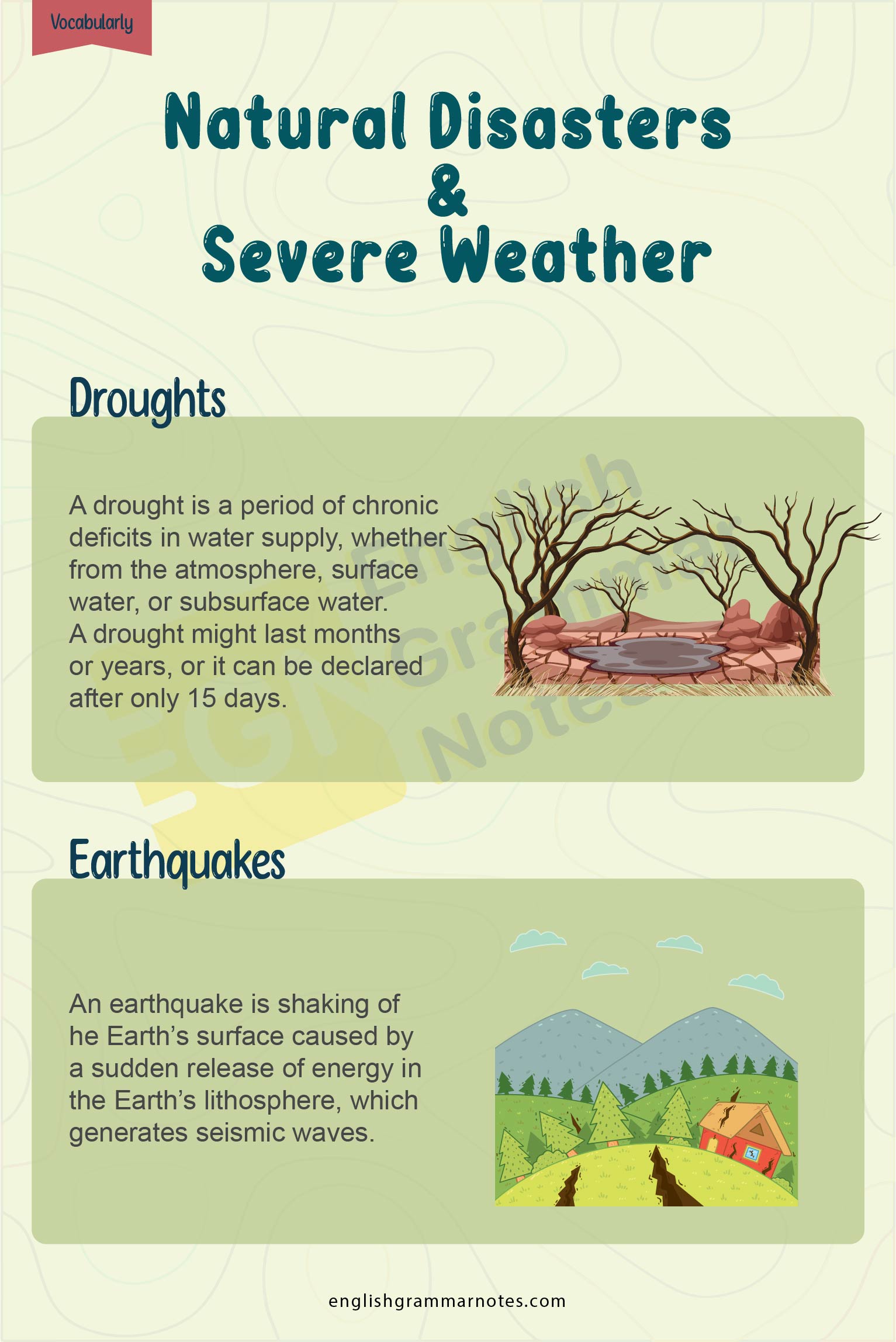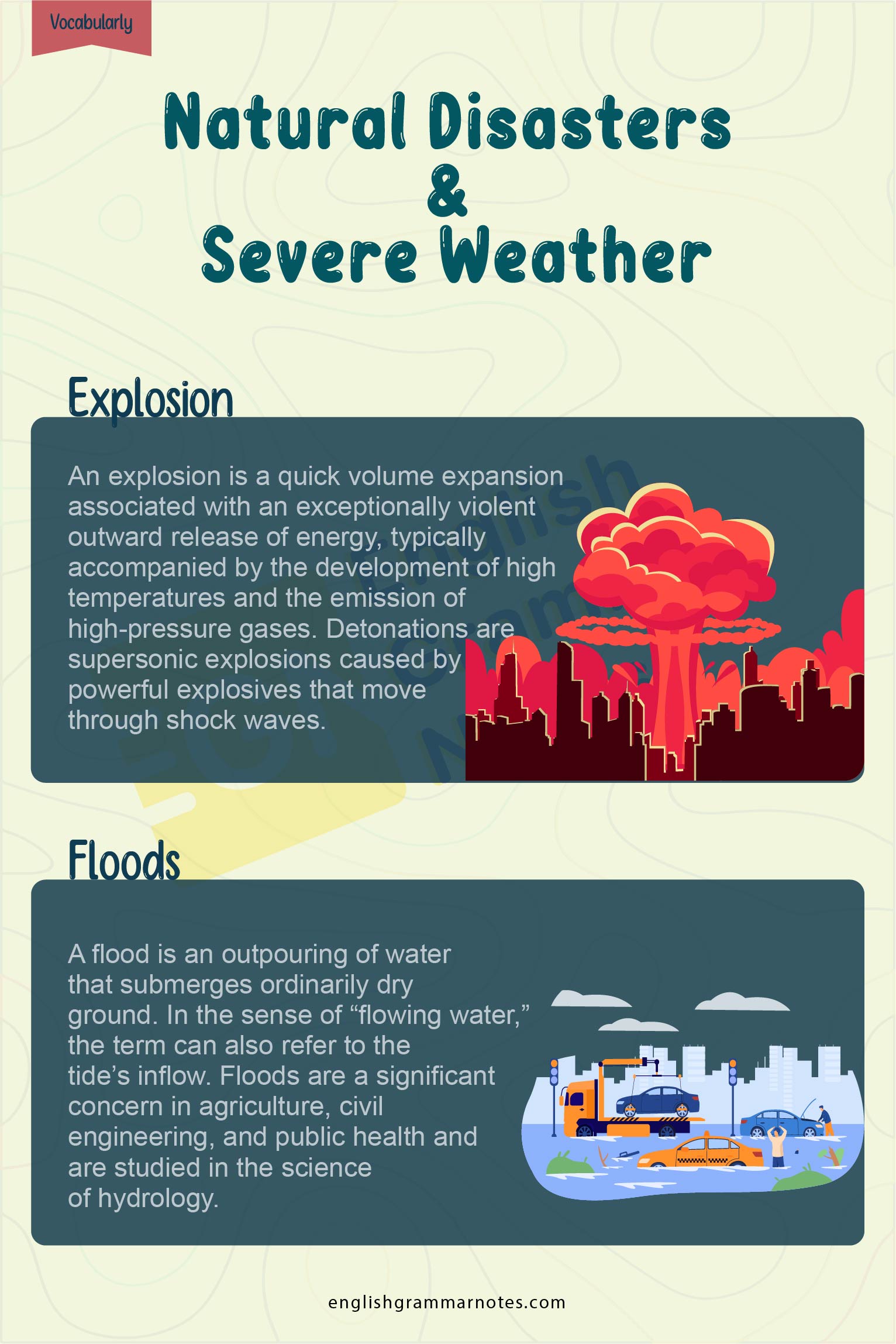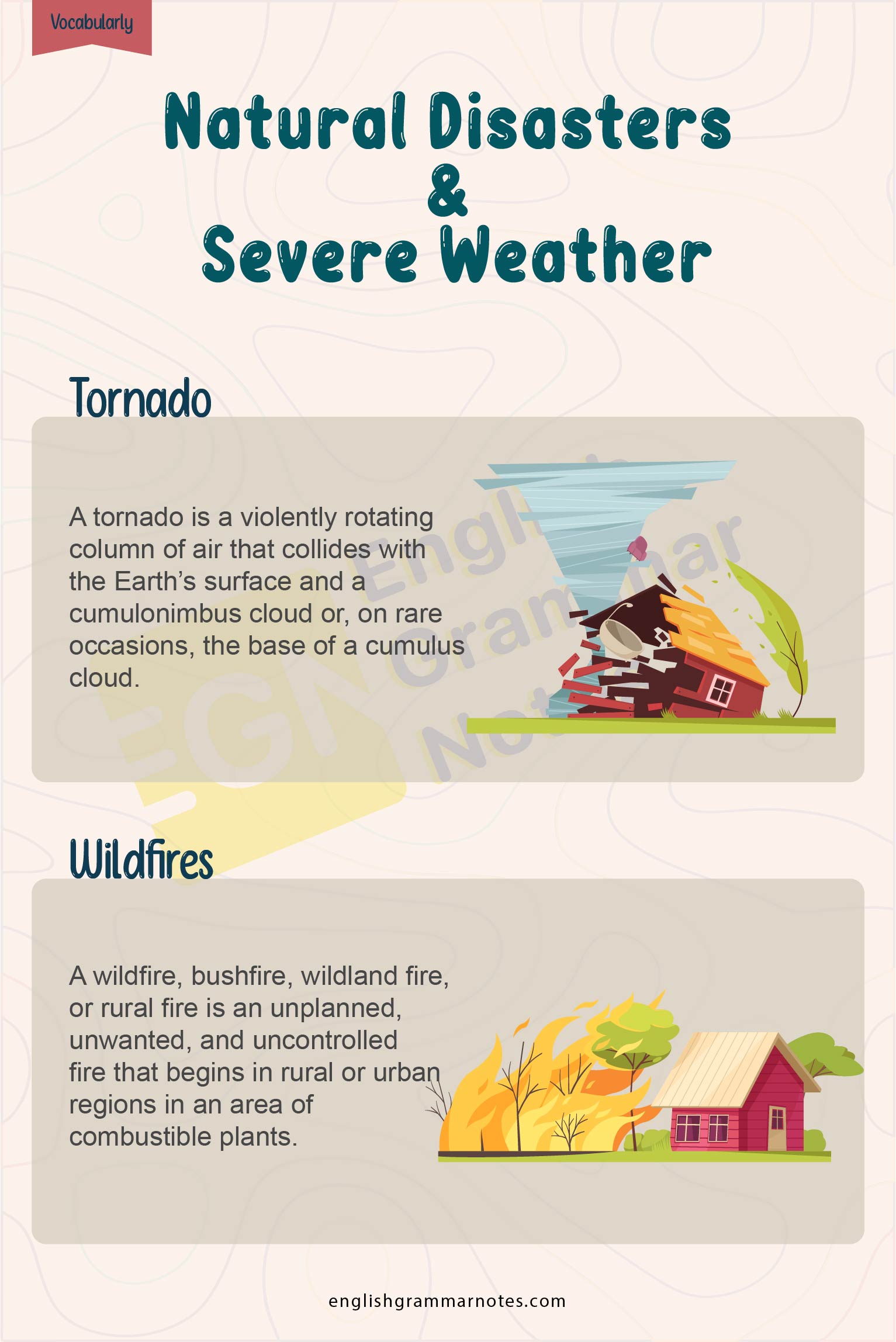Weather and Natural Disasters Vocabulary: In the English language, different types of catastrophic events have been given different names; these are called natural disasters. In this article, you will find different types of natural disasters with pictures that will help you understand them and add them to your vocabulary. The list also includes various types of severe weather conditions that one may face. So here is a list of natural disasters and severe weather that will help you add a few more words to your vocabulary.
Study the most important English Vocabulary Words identified by our experts and learn the right vocabulary to use in your day to day conversations
List of Natural Disasters and Severe Weather Vocabulary words in English
- Name of Natural Disasters and Severe Weather Vocabulary words
- Description of the Natural Disasters and Severe Weather Vocabulary words.
Name of Natural Disasters and Severe Weather Vocabulary words
Natural disasters are catastrophic catastrophes that occur as a result of any natural phenomenon on Earth. Floods and hurricanes, as well as tsunamis and earthquakes, are examples of natural disasters. Various types of natural disasters occur around the world. There are various causes of natural disasters, starting from artificial to natural reasons. If precautions are not taken in time, these can severely affect the continuity of a region or community.
List of Natural Disasters and Severe Weather
- Avalanche
- Blizzards
- Cold Waves
- Derecho
- Downburst
- Droughts
- Dust Storm
- Earthquakes
- Explosion
- Firestorms
- Floods
- Hailstorm
- Heat Waves
- Heavy Snowfall
- Ice Storms
- Landslide
- Liminic Eruptions
- Sinkholes
- Squall Line
- Strong Extratropical Cyclones
- Thunderstorms
- Tornado
- Tropical Cyclone
- Tsunami
- Volcanic Eruptions
- Waterspout
- Wildfires
Description of the Natural Disasters and Severe Weather Vocabulary words.
Avalanche
Avalanche is a fast-moving flow of snow down a slope, such as a hill or a mountain. Avalanches can occur spontaneously due to variables such as excessive precipitation or a decreasing snowpack or due to external sources such as humans, animals, and earthquakes.
Blizzards
A blizzard is a severe snowstorm with sustained winds of at least 56 km/h that lasts for an extended time—typically three hours or more. A ground blizzard is a weather situation where there is no falling snow, but instead, loose snow on the ground is lifted and thrown by strong winds.
Cold Waves
A cold wave is defined as a sudden drop in temperature over 24 hours. The rate at which the temperature drops and the minimum temperature obtained determine the specific criterion for a cold wave. Cold waves cover far more ground than blizzards, ice storms, and other winter threats.
Derecho
A derecho is a widespread, long-lasting straight-line windstorm associated with a fast-moving cluster of severe thunderstorms known as a mesoscale convective system. Derechos can produce hurricane-force winds, tornadoes, severe rainfall, and flash floods.
Downburst
A downburst is a powerful ground-level wind system that originates from an above-ground point source and blows radially, that is, in straight lines in all directions from the point of contact at ground level.
Droughts
A drought is a period of chronic deficits in water supply, whether from the atmosphere, surface water, or subsurface water. A drought might last months or years, or it can be declared after only 15 days.
Dust Storm
A dust storm, often known as a sandstorm, is a common meteorological phenomenon in arid and semi-arid environments. Dust storms form when a strong wind or gust front pushes loose sand and dirt from a dry surface.
Earthquakes
An earthquake is shaking of the Earth’s surface caused by a sudden release of energy in the Earth’s lithosphere, which generates seismic waves.
Explosion
An explosion is a quick volume expansion associated with an exceptionally violent outward release of energy, typically accompanied by the development of high temperatures and the emission of high-pressure gases. Detonations are supersonic explosions caused by powerful explosives that move through shock waves.
Firestorms
A firestorm is ablaze that becomes so large that it generates and supports its wind system. It is most often a natural occurrence caused by some of the greatest bushfires and wildfires.
Floods
A flood is an outpouring of water that submerges ordinarily dry ground. In the sense of “flowing water,” the term can also refer to the tide’s inflow. Floods are a significant concern in agriculture, civil engineering, and public health and are studied in the science of hydrology.
Hailstorm
Hail is classified as a type of solid precipitation. It is separate from ice pellets, which are sometimes confused. It is made up of balls or irregular lumps of ice; each referred to as a hailstone. In general, ice pellets fall in cold weather, but cold surface temperatures substantially slow hail formation.
Heat Waves
A heatwave, sometimes known as a heatwave, is a period of scorching weather that may be accompanied by significant humidity, particularly in oceanic climate countries. While definitions differ, a heatwave is typically defined as typical weather in the location and average temperatures for the season.
Ice Storms
Ice stormm are winter storms that consists of freezing rain. It is sometimes referred to as a glazing event or as a silver thaw in some parts of the United States. They are not often intense storms but rather soft rains that occur at temperatures just below freezing. An ice storm is defined as a storm that produces at least 0.25-inch (6.4-mm) of ice on exposed surfaces.
Landslide
Landslides, also known as landslips, are numerous types of mass wasting that can encompass a wide range of ground motions, such as rockfalls, deep-seated slope failures, mudflows, and debris flows.
Liminic Eruptions
A limnic eruption is a unusual sort of natural disaster in which dissolved carbon dioxide erupts unexpectedly from deep lake waters, generating a gas cloud capable of drowning wildlife, cattle, and humans. As rising CO 2 displaces water, a limnic eruption may also create tsunamis.
Sinkholes
A sinkhole, also known as a cenote, sinkhole, swallet, swallow hole, or doline, is a depression or hole in the ground created by surface layer collapse. The majority are caused by karst processes, such as the chemical disintegration of carbonate rocks or suffocation.
Squall Line
Squall lines are lines of thunderstorms that form along or ahead of a cold front. It includes heavy rain, hail, frequent lightning, strong straight-line winds, and the possibility of tornadoes and waterspouts.
Strong Extratropical Cyclones
A cyclone is an extratropical storm (sometimes known as a mid-latitude cyclone). It is a big low-pressure area featuring clouds, rain, and strong winds. Fronts generally link these cyclones. A front is a weather system that causes changes in the weather. It occurs when a frigid air mass collides with a boiling air mass.
Thunderstorms
A thunderstorm, often known as an electrical storm or a lightning storm, is a type of storm distinguished by the presence of lightning and its acoustic effect on the Earth’s atmosphere, known as thunder. Thundershowers are the name given to relatively weak thunderstorms.
Tornado
A tornado is a violently rotating column of air that collides with the Earth’s surface and a cumulonimbus cloud or, on rare occasions, the base of a cumulus cloud.
Tropical Cyclone
A tropical cyclone is a rapidly rotating storm system with a low-pressure core, a closed low-level atmospheric circulation, strong winds, and a spiral arrangement of thunderstorms causing heavy rain and squalls.
Tsunami
A tsunami is a set of waves in a body of water created by displacing a significant volume of water, most commonly in an ocean or a big lake. Tsunamis are caused by earthquakes, volcanic eruptions, and other underwater explosions above or below water.
Volcanic Eruptions
A volcanic eruption occurs when lava and gas are ejected from a volcano, sometimes explosive. A ‘glowing avalanche,’ which occurs when recently erupted lava rushes down the flanks of a volcano, is the deadliest sort of eruption.
Waterspout
A waterspout is a powerful columnar vortex that forms over a body of water. Some are linked to cumulus congestus clouds, some to cumuliform clouds, and others to cumulonimbus clouds.
Wildfires
A wildfire, bushfire, wildland fire, or rural fire is an unplanned, unwanted, and uncontrolled fire that begins in rural or urban regions in an area of combustible plants.
Natural Disasters!!! This useful lesson shows a list of vocabulary words that are used when talking about natural disasters. Each word has an example sentence that is used to provide context.
A natural disaster is the name of any natural hazard associated with a natural hazard such as floods, tornadoes, hurricanes, volcanoes, earthquakes, or catastrophes that affect the environment in such a way that causes natural resources, financial and loss of life.
Natural Disasters List
- Tornado
- Flood
- Natural wildfire
- Earthquake
- Drought
- Tsunami
- Landslide
- Typhoon
- Volcano eruption
- Ice storm
- Sinkhole
- Sandstorm
- Hurricane
- Fog
- Thunderstorm
- Drizzle
- Avalanche
- Lightning
- Extreme heat
- Dust storm
- Cyclone
- Hailstorm
- Blizzard
- Waterspout
Examples of Natural Disasters
Tornado
- The town was hit by a tornado last night.
Flood
- The flood last year was a terrible catastrophe in which many people died.
Natural wildfire
- In Northern California, a wildfire has spread a haze of smoke over 200 miles.
Earthquake
- Many buildings fell down during the earthquake.
Drought
- The drought has made farmers anxious about the harvest.
Tsunami
- No one knows the height of the tsunami caused by this eruption.
Landslide
- After the landslide, volunteers worked in relays to rescue people buried under the rubble.
Typhoon
- His home was destroyed in a typhoon.
Volcano eruption
- The volcano erupted in 1980, devastating a large area of Washington state.
Ice storm
- The next day, an ice storm left 400,000 Detroit residents without electricity.
Sinkhole
- To a geologist, this is a simple limestone sinkhole.
Sandstorm
- His plane made a crash-landing during a sandstorm yesterday.
Hurricane
- The hurricane is moving to the west at about 18 miles per hour.
Fog
- All flights have been canceled because of fog.
Thunderstorm
- We enjoyed the picnic until a thunderstorm intervened.
Drizzle
- A light drizzle had started by the time we left.
Avalanche
- They were killed by an avalanche in the Swiss Alps.
Lightning
- The old tree behind our house was riven by lightning last night.
Extreme heat
- After three weeks she had got used to the extreme heat.
Dust storm
- Pigeons fly through a dust storm in Kuwait City.
Cyclone
- The cyclone has resulted in many thousands of deaths.
Hailstorm
- The fruit trees were beaten down by the heavy hailstorm.
Blizzard
- Eleanor arrived in the midst of a blizzard.
Waterspout
- I notice a waterspout at the horizon and watch it until it moves out of sight.
Natural Disasters Vocabulary | Infographic
Names of Natural Disasters in English
Last Updated on January 18, 2021

No matter where you are teaching in the world, chances are your students have had some experience with natural disasters. In order for them to talk about their experiences, first, they need to learn the names of natural disasters in English. Below you’ll find a list of natural disaster words, some free natural disaster flashcards, and a natural disasters PowerPoint lesson to teach these words in class.
Here is an extensive list of natural disasters vocabulary. Each word is the name of a different natural disaster in English. If you would like to download and print this list, you can do so below.
- earthquake
- tsunami
- typhoon
- hurricane
- flood
- volcanic eruption
- storm
- tornado
- heat wave
- drought
- forest fire
- avalanche
- hailstorm
- rainstorm
- snowstorm
- sandstorm
- flash flood
- cyclone
PDF List Of Natural Disaster Words

Natural Disaster Flashcards

If you’re teaching natural disasters vocabulary, then these free flashcards will come in handy. The PDF below includes 18 large flashcards with the names of natural disasters in English with pictures.
Natural Disasters PowerPoint Lesson

This PPT includes 18 natural disaster words with pictures. This is great for teachers to use in class to teach natural disaster vocabulary.
Английские слова по теме «Стихийные бедствия»
- hail [heɪl] – град
- lava [ˈlɑːvə] – лава
- magma [ˈmægmə] – магма
- drought [draʊt] – засуха
- deluge [ˈdɛljuːʤ] – потоп
- gust [gʌst] – порыв ветра
- flood [flʌd] – наводнение
- twister [ˈtwɪstə] – смерч
- blizzard [ˈblɪzəd] – метель
- rescue [ˈrɛskjuː] – спасать
- damage [ˈdæmɪʤ] – повреждать
- cyclone [ˈsaɪkləʊn] – циклон
- landslip [ˈlændslɪp] – обвал
- tsunami [tsuːˈnɑːmi] – цунами
- hurricane [ˈhʌrɪkən] – ураган
- lightning [ˈlaɪtnɪŋ] – молния
- whirlwind [ˈwɜːlwɪnd] – вихрь
- windstorm [ˈwɪndstɔːm] – буря
- volcano [vɒlˈkeɪnəʊ] – вулкан
- heat wave [hiːt] [weɪv] – жара
- destroy [dɪsˈtrɔɪ] – разрушать
- tornado [tɔːˈneɪdəʊ] – торнадо
- avalanche [ˈævəlɑːnʃ] – лавина
- hailstorm [ˈheɪlstɔːm] – ливень
- rainstorm [ˈreɪnstɔːm] – ливень
- snowstorm [ˈsnəʊstɔːm] – метель
- whirlpool [ˈwɜːlpuːl] – водоворот
- landslide [ˈlændslaɪd] – оползень
- seismic [ˈsaɪzmɪk] – сейсмический
- cataclysm [ˈkætəklɪzm] – катаклизм
- thunderstorm [ˈθʌndəstɔːm] – гроза
- storm, gale [stɔːm], [geɪl] – шторм
- earthquake [ˈɜːθkweɪk] – землетрясение
- destruction [dɪsˈtrʌkʃən] – разрушение
- sandstorm [ˈsændstɔːm] – песчаная буря
- wind scale [wɪnd] [skeɪl] – шкала ветра
- fatality [fəˈtælɪti] – смертельный исход
- casualty [ˈkæʒjʊəlti] – несчастный случай
- dust storm [dʌst] [stɔːm] – песчаная буря
- permafrost [ˈpɜːməfrɒst] – вечная мерзлота
- forest fire [ˈfɒrɪst] [ˈfaɪə] – лесной пожар
- tidal wave [ˈtaɪdl] [weɪv] – приливная волна
- low-pressure [ləʊ]-[ˈprɛʃə] – низкое давление
- high-pressure [haɪ]-[ˈprɛʃə] – высокое давление
- violent storm [ˈvaɪələnt] [stɔːm] – сильный шторм
- cumulonimbus [ˈkjuːmjʊləˈnɪmbəs] – кучево-дождевые облака
- volcanic eruption [vɒlˈkænɪk] [ɪˈrʌpʃən] – извержение вулкана
- natural disasters [ˈnæʧrəl] [dɪˈzɑːstəz] – стихийные бедствия
| № | Слово | Транскрипция | Перевод |
|---|---|---|---|
| 1 | hail | [heɪl] | град |
| 2 | lava | [ˈlɑːvə] | лава |
| 3 | magma | [ˈmægmə] | магма |
| 4 | drought | [draʊt] | засуха |
| 5 | deluge | [ˈdɛljuːʤ] | потоп |
| 6 | gust | [gʌst] | порыв ветра |
| 7 | flood | [flʌd] | наводнение |
| 8 | twister | [ˈtwɪstə] | смерч |
| 9 | blizzard | [ˈblɪzəd] | метель |
| 10 | rescue | [ˈrɛskjuː] | спасать |
| 11 | damage | [ˈdæmɪʤ] | повреждать |
| 12 | cyclone | [ˈsaɪkləʊn] | циклон |
| 13 | landslip | [ˈlændslɪp] | обвал |
| 14 | tsunami | [tsuːˈnɑːmi] | цунами |
| 15 | hurricane | [ˈhʌrɪkən] | ураган |
| 16 | lightning | [ˈlaɪtnɪŋ] | молния |
| 17 | whirlwind | [ˈwɜːlwɪnd] | вихрь |
| 18 | windstorm | [ˈwɪndstɔːm] | буря |
| 19 | volcano | [vɒlˈkeɪnəʊ] | вулкан |
| 20 | heat wave | [hiːt] [weɪv] | жара |
| 21 | destroy | [dɪsˈtrɔɪ] | разрушать |
| 22 | tornado | [tɔːˈneɪdəʊ] | торнадо |
| 23 | avalanche | [ˈævəlɑːnʃ] | лавина |
| 24 | hailstorm | [ˈheɪlstɔːm] | ливень |
| 25 | rainstorm | [ˈreɪnstɔːm] | ливень |
| 26 | snowstorm | [ˈsnəʊstɔːm] | метель |
| 27 | whirlpool | [ˈwɜːlpuːl] | водоворот |
| 28 | landslide | [ˈlændslaɪd] | оползень |
| 29 | seismic | [ˈsaɪzmɪk] | сейсмический |
| 30 | cataclysm | [ˈkætəklɪzm] | катаклизм |
| 31 | thunderstorm | [ˈθʌndəstɔːm] | гроза |
| 32 | storm, gale | [stɔːm], [geɪl] | шторм |
| 33 | earthquake | [ˈɜːθkweɪk] | землетрясение |
| 34 | destruction | [dɪsˈtrʌkʃən] | разрушение |
| 35 | sandstorm | [ˈsændstɔːm] | песчаная буря |
| 36 | wind scale | [wɪnd] [skeɪl] | шкала ветра |
| 37 | fatality | [fəˈtælɪti] | смертельный исход |
| 38 | casualty | [ˈkæʒjʊəlti] | несчастный случай |
| 39 | dust storm | [dʌst] [stɔːm] | песчаная буря |
| 40 | permafrost | [ˈpɜːməfrɒst] | вечная мерзлота |
| 41 | forest fire | [ˈfɒrɪst] [ˈfaɪə] | лесной пожар |
| 42 | tidal wave | [ˈtaɪdl] [weɪv] | приливная волна |
| 43 | low-pressure | [ləʊ]-[ˈprɛʃə] | низкое давление |
| 44 | high-pressure | [haɪ]-[ˈprɛʃə] | высокое давление |
| 45 | violent storm | [ˈvaɪələnt] [stɔːm] | сильный шторм |
| 46 | cumulonimbus | [ˈkjuːmjʊləˈnɪmbəs] | кучево-дождевые облака |
| 47 | volcanic eruption | [vɒlˈkænɪk] [ɪˈrʌpʃən] | извержение вулкана |
| 48 | natural disasters | [ˈnæʧrəl] [dɪˈzɑːstəz] | стихийные бедствия |
Сообщить об ошибке в статье
Читайте также:
▫ Английские слова по теме «Уход за маленькими детьми»
▫ Английские слова по теме «Описание погоды»
▫ Английские слова по теме «Природа»
Показать все статьи
| flood | наводнение | |
| raging flood | сильное наводнение | |
| drought | засуха | |
| decades of drought | десятилетия засухи | |
| tornado | торнадо | |
| to predict a tornado | предсказывать торнадо | |
| tsunami | цунами | |
| Indian Ocean tsunami | цунами в Индийском океане | |
| earthquake | землетрясение | |
| devastating earthquake | разрушительное землетрясение | |
| hurricane | ураган | |
| eye of a hurricane | глаз (центр) урагана | |
| landslide | оползень | |
| to trigger a landslide | вызывать оползень | |
| volcanic eruption | извержение вулкана | |
| dangerous volcanic eruption | опасное извержение вулкана | |
| heat wave | период сильной жары | |
| to suffer a heat wave | страдать от сильной жары | |
| avalanche | лавина, обвал | |
| Himalayan avalanche | лавина в Гималаях |
>> АНГЛИЙСКАЯ ЛЕКСИКА :: ВСЕ ТЕМЫ <<




